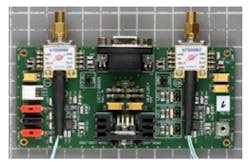Multimode Optical Receivers for Space-to-Ground Laser Communication
Discovery Semiconductors' pioneering multimode optical receivers up to 10 Gb/s are getting increasingly used for Space-to-Ground Laser Communication Links by Tesat Spacecom, of Germany, as well as, the European Space Agency (ESA).
"Using a multimode optical receiver in conjunction with a self-referencing DPSK interferometer allows for the collection of photons, of up to 36 times that of a single mode fiber. These low noise, multimode optical receivers are intended to be used at data rate of 1.8 Gb/s for ESA's Geostationary to ground station laser communication links," commented Dr. Zoran Sodnik, ESA's Head of Opto-Electronics Section.
Furthermore, Tesat Spacecom uses the balanced optical receivers as reference devices in their system test bed for Laser Communication Terminals (LCTs). The LCTs are working at 1064 nm with a 1.8 Gbps coherent BPSK communication system, and the balanced receivers from Discovery Semiconductors provide a low noise, high bandwidth standard.
Fig. 1: Discovery's Balanced Optical Receivers as integral part of the optical System Test bed for LCTs. Source: Tesat Spacecom
According to Dr. Frank Heine, Tesat Spacecom's Chief Scientist and Head of LCT Laser System Engineering, "The receivers are used in Tesat's Transportable optical ground station (T-AOGS) that is currently located in Teneriffe, Spain, where recently the first high speed laser communication with a geostationary spacecraft (Alphasat) has been achieved."
Fig.2: Tesat T-AOGS at the astronomical site in Teneriffe, Spain
"We have been working with Tesat and ESA for 12 years on multiple space related projects and are honored to be part of their team. We have built the infrastructure and technical skill sets for over two decades, which enable us to execute these challenging projects," commented Abhay M. Joshi, President and CEO, Discovery Semiconductors, Inc.
1References:
- The Tesat Transportable Adaptive Optical Ground Station, K.Saucke et.al, SPIE Photonics West 2016, Free-Space Laser Communication and Atmospheric Propagation XXVIII
- Extending EDRS to Laser Communicaton from Space to Ground, Zoran Sodnik et.a;, Proc. International Conference on Space Optical Systems and Applications (ICSOS) 2012, 13-2, Ajaccio, Corsica, France, October 9-12 (2012)
See Related Products:
- DSC-R405405ER - 20 GHz Linear Balanced Photoreceivers with Optional CDR
- DSC-R402 - 10 GHz Linear InGaAs PIN+TIA Optical Receiver with Optional CDR
- DSC-R412 - Linear AGC Balanced Receiver for 40G/100G Coherent Communications
Discovery Semiconductors is an industry leader in manufacturing ultrafast, high optical power handling InGaAs photodiodes, radio frequency over fiber optical receivers, balanced optical receivers and several other custom products for applications ranging from analog RF links to ultrafast digital communications.
For additional information, including complete product specifications, operational capabilities and pricing, or to discuss your application in detail, please call Discovery at: (609) 434-1311